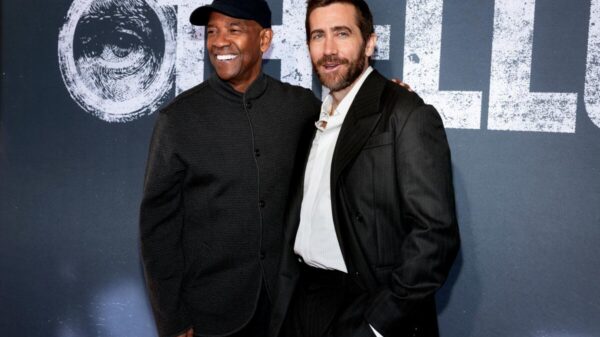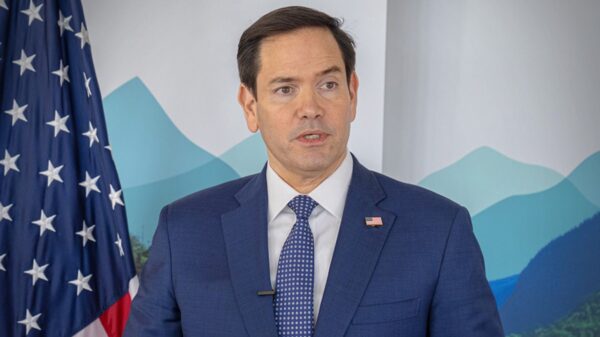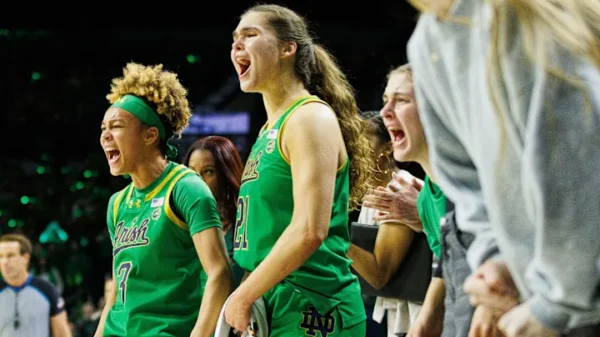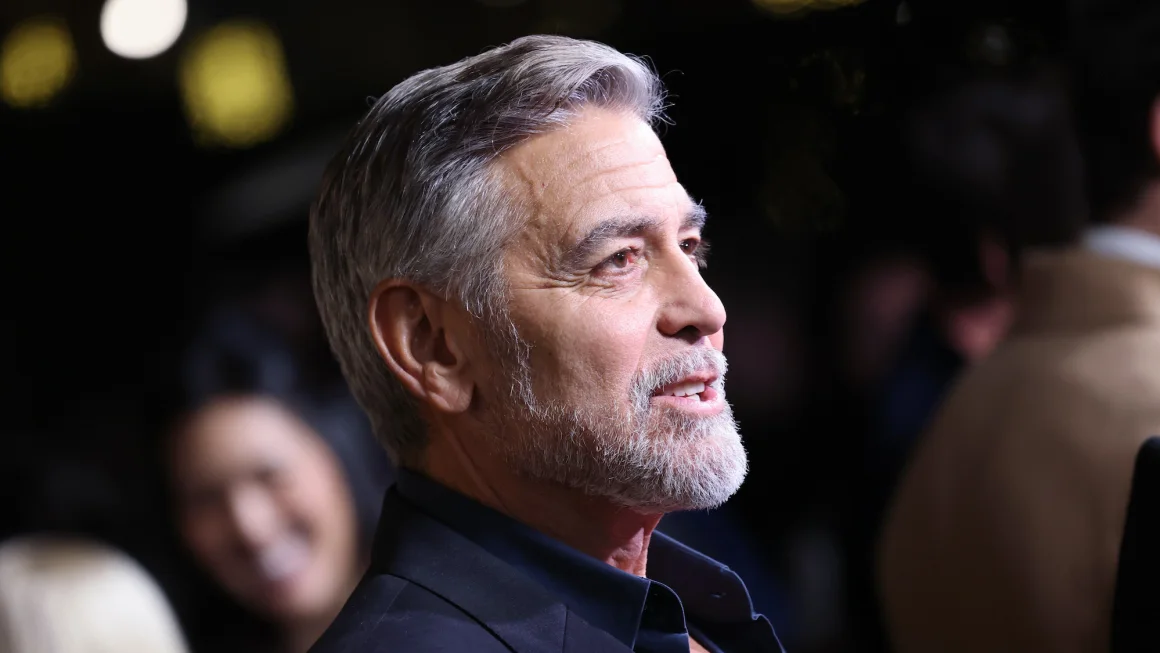Introduction
In a recent development within the entertainment industry, a notable exchange of words transpired between famed actor George Clooney and acclaimed filmmaker Quentin Tarantino. The incident took place during a GQ interview in which Clooney addressed Tarantino’s remarks concerning his movie star status. Quentin Tarantino, known for his candid and often provocative statements, had previously expressed skepticism about Clooney’s standing as a movie star. This skepticism did not sit well with Clooney, prompting him to openly express his discontent and to refute Tarantino’s perspective on the matter. The ensuing dialogue between these two Hollywood heavyweights has since become a topic of considerable interest and discussion within the film community and beyond.
The GQ Interview Context
The setting of the GQ interview radiated a sense of camaraderie as George Clooney and Brad Pitt, long-time friends and co-stars, sat down to discuss their latest project, “Wolfs.” This exclusive interaction, steeped in both professional insight and personal anecdotes, primarily aimed to shed light on their experiences working on the film. The interview, naturally, ventured beyond the specifics of “Wolfs,” providing a platform for Clooney to address recent comments by Quentin Tarantino regarding his movie star status.
Amidst a relaxed yet engaging atmosphere, the conversation revealed the deep mutual respect and genuine friendship between Clooney and Pitt. Each anecdote and insight reflected their remarkable rapport, making the dialogue not just about the film, but also about their enduring collaboration in Hollywood. The mood of the interview oscillated between light-hearted banter and thoughtful reflection, showcasing the duo’s ability to seamlessly blend humor with profound industry reflections.
Given the dual purpose of promoting their new film while addressing broader industry topics, the interview navigated through various subjects, from fond memories on set to Clooney’s nuanced perspective on his career. It was during this exchange that Clooney candidly responded to Tarantino’s remarks, providing an honest and measured perspective that intertwined with the broader thematic elements discussed. The chemistry between Clooney and Pitt, marked by moments of shared laughter and mutual admiration, underscored their solid bond, elevating the interview beyond a mere promotional piece into a testament of their collaborative journey.
The GQ interview, thus, was not just a platform for Clooney’s reflections on Tarantino’s comments, but also a vibrant showcase of his and Pitt’s dynamic partnership. This blend of personal rapport and professional discourse anchored the interview, making it a compelling narrative for fans and industry insiders alike, eager to gain deeper insights into the stars’ perspectives and their latest cinematic endeavor.
During a recent interview, Quentin Tarantino made waves with his candid remarks about George Clooney’s standing in Hollywood. Tarantino, known for his unfiltered opinions, stated unequivocally that he does not regard Clooney as a movie star. These comments were part of a broader discussion on the evolution and current state of what constitutes a movie star in today’s film industry.
Quentin Tarantino’s controversial comments came to light during a podcast interview where he dissected various aspects of Hollywood’s glittering landscape. Addressing the shifting dynamics of stardom within the industry, Tarantino suggested that the traditional definition of a movie star has evolved significantly over the years. Within this context, Tarantino singled out Clooney, stating that despite his considerable success and popularity, he does not fit the archetype of what Tarantino considers a classic movie star.
Tarantino elaborated on the attributes he believes are essential to movie stardom, citing charisma, a certain ‘larger-than-life’ quality, and an almost mythical screen presence. According to him, these traits were exemplified by Hollywood icons of the past, like Marilyn Monroe, James Dean, and Marlon Brando. In his view, while George Clooney is undeniably talented and successful, his career trajectory and public persona do not align with these legendary characteristics.
These remarks have sparked considerable debate, especially since George Clooney has enjoyed a prolific career, featuring in numerous blockbuster films and acclaimed television series. Despite his contributions to the industry and numerous accolades, Tarantino’s perspective on Clooney’s movie star status has added a new dimension to the ongoing conversation around the criteria that define Hollywood’s elite.
The interview and the ensuing buzz reflect Tarantino’s ability to provoke thought and conversation within the industry. His commentary serves as a reminder of the subjective nature of stardom and the varied perceptions that continue to shape the entertainment world.
Clooney’s Profanity-Laced Response
George Clooney did not mince words in his candid response to Quentin Tarantino’s commentary regarding his movie star status. In what can be described as a mix of playful yet irritated tone, Clooney opted for a blunt and slightly profane approach to express his feelings. During an interview, the actor highlighted his thoughts on the film industry and responded directly to Tarantino’s assertions. Clooney’s response was emblematic of his straightforward demeanor, demonstrating an unfiltered communication style that has become synonymous with his public persona.
While addressing Tarantino’s comments, Clooney exhibited a mixture of humor and annoyance. He acknowledged Tarantino’s point of view but did not shy away from articulating his own perspective. His use of profane language underscored his frustration, reflecting a deep-seated belief in his own accomplishments and a desire to set the record straight. He humorously argued that the industry is continuously evolving, and so is the definition of what constitutes a movie star. Clooney’s candid speech provided a glimpse into his unvarnished opinions, marking a stark contrast to more traditionally measured celebrity responses.
Clooney’s remarks also touched on broader themes about the nature of fame and the dynamics of the film industry. By openly challenging Tarantino’s assertions, he not only defended his standing but also engaged in a more extensive dialogue about the meritocratic aspects of Hollywood. His profanity-laden retort served to embellish his commitment to authenticity and a no-holds-barred attitude towards self-expression. In doing so, Clooney reinforced the idea that celebrity discourse can be both critical and irreverent, painting a multi-faceted image of his character beyond the silver screen.
Brad Pitt’s Role in the Exchange
As George Clooney candidly responded to Quentin Tarantino’s remarks about his movie star status, another iconic actor found himself intertwined in the conversation—Brad Pitt. Well regarded for his frequent collaborations with Tarantino, Pitt’s reactions during Clooney’s response added a notable layer to the exchange. Listening attentively, Pitt’s background laughter punctuated Clooney’s comments, showcasing the camaraderie between the two actors, often sharing off-screen banter that mirrors their on-screen chemistry.
Brad Pitt has established a distinguished relationship with Quentin Tarantino, having starred in acclaimed films such as “Inglourious Basterds” and “Once Upon a Time in Hollywood.” This working relationship with Tarantino underscores Pitt’s understanding of the director’s perspective on Hollywood’s evolving star system. Yet, during Clooney’s response, Pitt’s supportive humor indicated his solidarity with his peer, reinforcing their professional and personal connection.
The dynamics between Pitt and Clooney have been well-documented both in the media and through their collaborative projects. Their frequent joint ventures, such as the “Ocean’s” trilogy, have highlighted their mutual respect and camaraderie. Therefore, Pitt’s laughter in the background served to underline this rapport, presenting a united front amidst industry critiques. This genuine interaction not only showcased Pitt’s affable personality but also elevated the dialogue, making it more engaging.
In observing Brad Pitt’s reactions during Clooney’s candid response, it becomes evident that their friendship transcends the screen, flourishing in real-world interactions. Pitt’s lighthearted approach juxtaposed with Clooney’s earnest retort provided a complete picture of their longstanding relationship. This interplay between Pitt and Clooney exemplifies the supportive and collegial nature often found among seasoned Hollywood professionals.
Historical Context of Their Careers
George Clooney and Quentin Tarantino are monumental figures in the film industry, each leaving an indelible mark through their distinctive contributions. George Clooney, known for his charismatic screen presence, has successfully transitioned from television to film. Gaining fame from his role in the television series “ER,” Clooney’s career catapulted with his leading roles in films such as “Ocean’s Eleven,” “Michael Clayton,” and “Gravity.” His work in the acclaimed “Syriana” earned him an Academy Award for Best Supporting Actor, cementing his status as a versatile and accomplished actor. Moreover, Clooney’s directorial ventures, including “Good Night, and Good Luck” and “The Ides of March,” illustrate his multifaceted talent and commitment to socially relevant storytelling.
Quentin Tarantino, by contrast, revolutionized modern cinema with his unique narrative style and penchant for complex characters and dialogue. Bursting onto the scene with “Reservoir Dogs” and the critically acclaimed “Pulp Fiction,” Tarantino’s direction and screenwriting have garnered him numerous awards, including the Palme d’Or at Cannes and Oscars for “Pulp Fiction” and “Django Unchained.” His films, such as “Kill Bill,” “Inglourious Basterds,” and “Once Upon a Time in Hollywood,” are revered for their innovative blend of genre, structure, and aesthetic. Tarantino’s influence extends beyond his own films, inspiring a new wave of filmmakers to adopt and adapt his stylistic flourishes.
The significance of this recent controversy between Clooney and Tarantino lies in the stature both personalities hold within the industry. Clooney’s reputation as a beloved actor and filmmaker contrasts with Tarantino’s role as a maverick auteur, making their publicized dispute over movie star status especially compelling. This debate not only highlights their differing perspectives on stardom and cinematic impact but also invites reflection on how both figures have shaped and been shaped by Hollywood. Their careers, replete with achievements and milestones, underscore the profound influence they wield, making any commentary between them notable in the annals of contemporary cinema.
Following George Clooney’s candid response to Quentin Tarantino’s comments regarding his movie star status, the public and media erupted with a flurry of reactions. Social media platforms became breeding grounds for heated debates, with fans and critics alike weighing in on the exchange. Hashtags such as #ClooneyVsTarantino and #MovieStarDebate trended on Twitter, showcasing the public’s divided opinion on the matter.
Headlines from notable publications further fueled the conversation. Leading entertainment magazines such as Variety and The Hollywood Reporter covered the interaction extensively, with headlines like “Clooney Fires Back: A Hollywood Showdown” and “Tarantino’s Movie Star Debate Sparks Clooney’s Critique.” These articles delved deep into the historical context of each figure’s career and influence in Hollywood.
Film critics and industry insiders also chimed in, providing their nuanced perspectives. Renowned critic Peter Travers commented, “Clooney’s response highlights a crucial element of Hollywood’s evolving star system. Both Clooney and Tarantino have unparalleled contributions, albeit from different vantage points.” Similarly, industry veteran Ellen Goldsmith-Vein opined, “This is not merely a clash of egos but an important discourse on the shifting paradigms of what constitutes a ‘movie star’ in today’s film industry.”
Beyond critics, fans displayed a spectrum of reactions. Some staunchly defended George Clooney, praising his humility and versatility as an actor. Others sided with Quentin Tarantino, arguing that his definition of a movie star resonates more with the golden age of Hollywood. Memes and gifs referencing iconic scenes from both Clooney’s and Tarantino’s films added a layer of humor to the discourse, demonstrating the widespread engagement of the audience.
Overall, the public and media’s reactions underscore the enduring fascination with Hollywood’s inner workings and the powerful personas that shape it. This debate has not only reignited conversations about star power but also emphasized the impactful legacies of both Clooney and Tarantino in the contemporary film landscape.
The Impact on Future Collaborations
In the wake of Quentin Tarantino’s remarks regarding George Clooney’s movie star status, speculation naturally follows about the potential impact on future collaborations. The entertainment industry often grapples with such public statements, which can influence personal dynamics and professional projects.
Given Clooney’s extensive experience and standing in Hollywood, his response to Tarantino’s comments was both measured and candid. This reaction speaks volumes about his professionalism and resilience, qualities that are indispensable in navigating the complex web of Hollywood relationships. On the other hand, Tarantino’s forthrightness has always been a notable aspect of his personality, contributing to his reputation as a filmmaker who speaks his mind.
While some might argue that this public exchange could cause a rift between the two, it’s important to remember that the entertainment industry is no stranger to conflicts and reconciliations. Both Clooney and Tarantino are seasoned professionals who have experienced the vicissitudes of Hollywood careers. Their ability to continue collaborating will likely depend on their mutual respect and the insights they bring to the table.
It’s worth noting that fans of both Clooney and Tarantino are deeply invested in their work. A potential fallout might disappoint those eager to see future collaborations between the actor and the director. However, reconciling differences could lead to even more compelling projects, combining Clooney’s charismatic screen presence with Tarantino’s distinctive directorial style.
In conclusion, while the exchange between George Clooney and Quentin Tarantino may have stirred the waters, its ultimate impact on future collaborations remains to be seen. Hollywood thrives on its ability to adapt to challenges, and the talents and visions of Clooney and Tarantino are no exceptions. Fans can remain hopeful for innovative projects emerging from this dynamic, regardless of the current discourse.




































